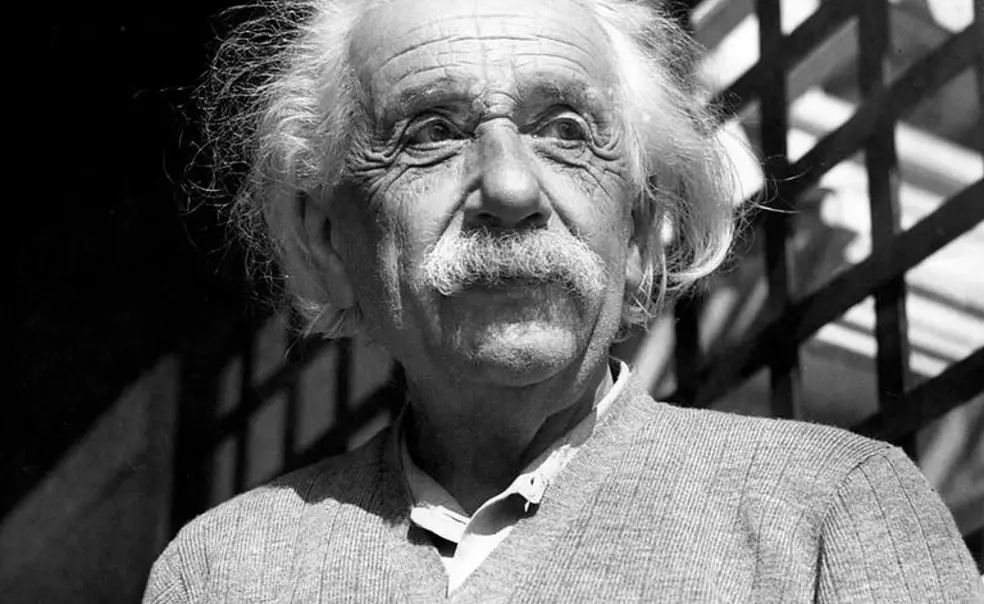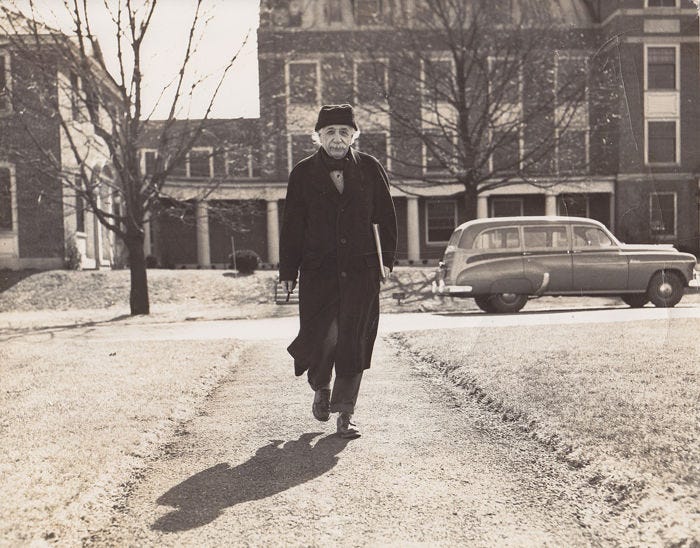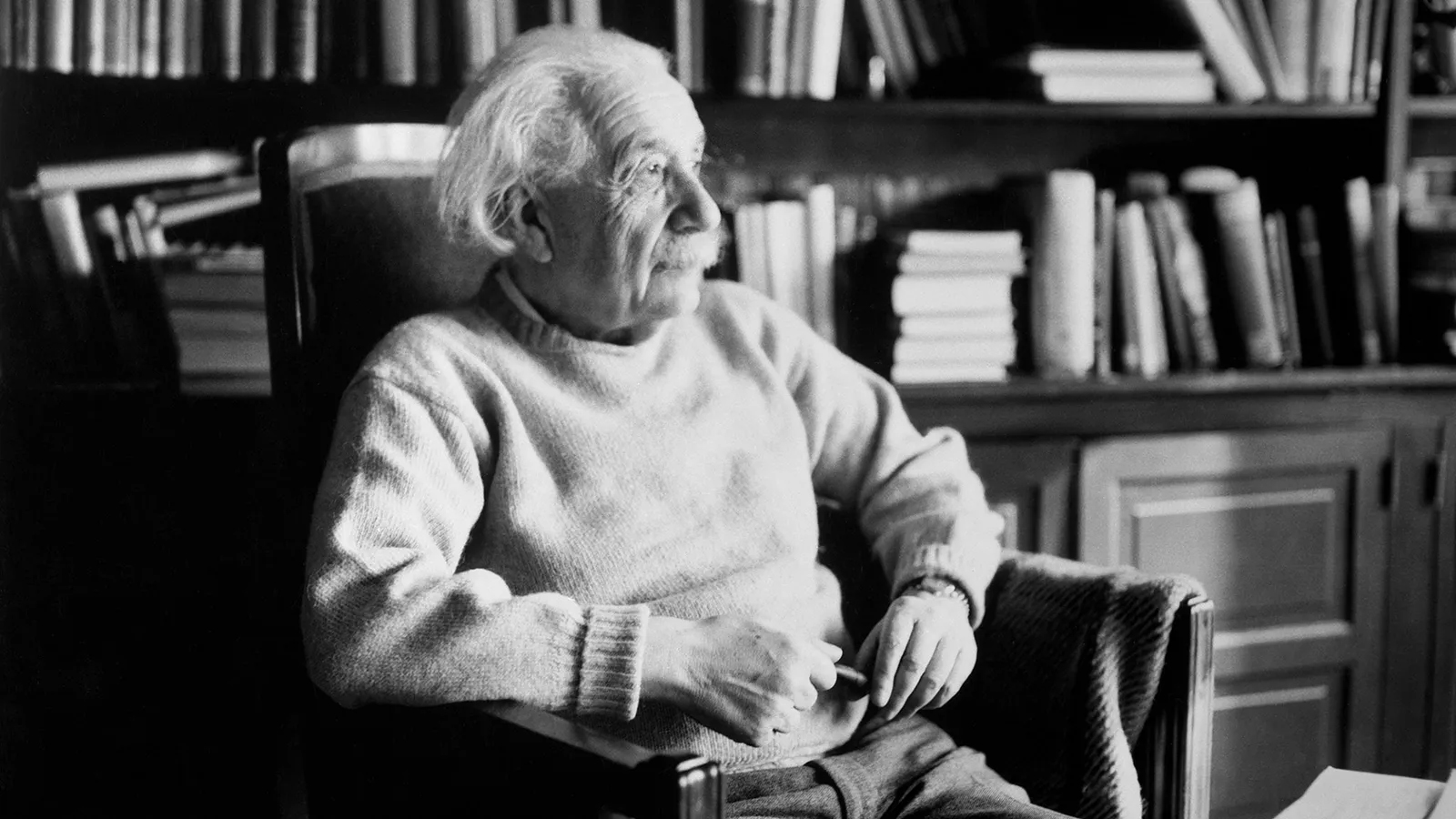Allbert Einstein: The Gentle Touch of Genius
In 1944, shortly before I came to Princeton as a photographer with the University, I was driving along Mercer Street at dusk when half-way down the block, at street level, I saw a bodiless head—just two arms out-stretched and a strangely familiar mop of shaggy white hair. Acting on professional instinct, I jumped out of the car, camera in hand, and snapped a picture. Only then did I hear the croaking sounds he was making, and see the strained expression on his face. I rushed over, grabbed him under the arms, and hauled out one of the greatest scientists the world has ever known. Albert Einstein had fallen down an open manhole.

As I walked him the short distance to his home at 112 Mercer Street he implored me in a flood of German-accented emotional phrases, mingled with sobs of pain, not to publish the picture. I promised him I wouldn’t. and I never did. Actually, I couldn’t have even if I wanted to. When I got home that night I discovered the picture was a blank. In my excitement, I had forgotten to pull the film slide.
Off and on for the next 11 years of our curious association, Professor Einstein reminded me of my promise about the manhole picture. It got to be a kind of joke between us; but I could never bring myself to tell him that the last laugh was on me. I was ashamed to—partly, I think, because of old Pow Edwards, a geometry teacher who had made me feel a hopeless failure when I was a schoolboy back in England. At my age, I didn’t want to be tagged a dunce all over again, and I was still leary of mathematicians.
In fact, I half-expected Einstein to behave and dress the way Pow Edwards did. Shortly after our unorthodox introduction, I made the first of many appointments to photograph him officially. I arrived at his home on the dot and, after persuading his watchdog of a secretary, Helen Dukas, that this was a valid assignment, approached his study. I was prepared to find him waiting impatiently in a wing collar, frock coat and all the dignity of his genius. Instead, this world-famous figure was dressed in baggy slacks and an old sweater, his mustache scraggly, his hair looking as if it hadn’t been cut or combed for months.
I was appalled. This was to be an official birthday portrait. I wondered why, since he hadn’t done anything about the rest of his face, he had bothered to shave. I could hardly suggest that he spruce himself up for my camera, though on several occasions later I did try surreptitiously to brush his hair back behind his ears—accidentally, as it were, while arranging the lights behind his chair. But the unruly swatch always sprang forward again with a stubbornness of its own.
I gave up on his hair, but his feet continued to bother me. I am an Englishman by birth, with perhaps too rigid ideas about proper apparel—and Professor Einstein seldom wore socks. Though I tried taking all his pictures from the knees or waist up, it was difficult to keep my eyes off those bare ankles. I even considered sending him an anonymous gift of a pair of socks, thought that would have been not only insulting but useless.
Besides, during those first assignments I was constantly afraid that he would refuse to pose for me. I derived considerable prestige from the photographs I was privileged to take of him. Requests from all over the world were referred to me by the Institute for Advanced Study and by Princeton University. Two of my Einstein prints were reproduced on covers of the New York Times Magazine. I couldn’t afford to antagonize so important a subject, and what worried me was that he just barely tolerated the business of having his picture taken.
Once when I brought him a dozen extra prints of a particularly good portrait to give to his friends, he flipped through them, then shoved the whole batch aside. “I hate my pictures,” he said. “Look at my face. If it wasn’t for this,” he added, clapping his hands over his mustache in mock despair, “I’d look like a vooman.”
On another occasion, when a young couple at whose wedding he had been best man brought their son—a little boy of 18 months—to meet him, the child took one look and burst into a screaming fit. The parents were speechless with embarrassment, but Einstein’s eyes lighted up. He smiled approvingly, patted the youngster on the top of his head, and crooned: “You’re the first person in years who has told me what you really think of me.”
I was convinced that it would be extremely difficult to keep the cooperation of a man with so little vanity. At the same time I kept expecting him to change into my private notion of the way a world genius should be—proud, brilliantly erudite, perhaps somewhat impatient with men of lesser intellect.
But he didn’t change. Instead, I think he changed me a little. Gradually I lost my awe of him. So much so that one day I blurted: “Professor Einstein, why don’t you wear socks?”
As soon as I’d said it I was dismayed at my own recklessness. But the remark didn’t seem to faze him. “Oh,” he shrugged, lifting his trousers a bit and glancing down, “it would be an awful situation if the containers were of better quality than the meat.”
The way he said it—humorous, but sad too—made me realize that his sloppy sweat-shirt and uncombed hair and sockless shoes were somehow right for him. They truly reflected the humility of the man. If I’d taken his picture any other way I would have gotten my own image of how a great mathematician ought to look.
Thus Einstein taught me something about photography: that I must approach a subject with an open mind as well as an open shutter.
Besides humility, I began to sense another factor behind Einstein’s unkempt appearance: a profound simplicity that allowed him to ignore superficiality and go directly to the heart of things. Where most of us are like kites caught in the branches, entangled with our concerns for such things as comfort, success, the impression we are making on others, Einstein’s mind soared free. I doubt that he even knew what he ate. Certainly, he didn’t watch where he walked, of he wouldn’t have fallen down that manhole. Once when some company had sent him a very sizeable consulting fee, he used the check for a bookmark and lost the book.
I remember the afternoon that I watched helplessly as a newspaper photographer rudely backed him off the sidewalk and into the bushes, taking pictures and firing impertinent questions. When I told Einstein how mortified I was that any professional colleague of mine should behave that way he said, “Oh, I don’t pay any attention to those things. Anger dwells only in the bosom of fools.”
Another time he was at his desk when I entered his study, feverishly jotting in his notebook, not even aware that there was a cut on his face and that two bright streams of blood were running down his check. I was so alarmed that I interrupted to suggest that he put on a bandage. He muttered, “It’s not a matter,” and went on writing.
What struck me was that he automatically ignored the trivial, whether it happened to be a stranger’s rudeness or a cut on the cheek. He simplified his concerns in order to spend his brain wisely. But it wasn’t just a matter of withdrawing, or being “absent-minded-professorish.” For this same uncluttered attitude allowed him to speak directly with unaffected kindness and respect to every human being he met, child or adult, ignoring externals.
One afternoon a little girl of about seven, who also lived on Mercer Street in Princeton, rang Dr. Einstein’s doorbell and asked to see him. Miss Dukas said it would be impossible to disturb the professor. Just then Einstein happened to come down the front stairs. When he asked the youngster what she wanted, she took a hand from behind her back and offered him a sticky square of fudge which she said she has made herself. Einstein thanked her and ate the candy, whereupon she pulled the other hand from behind her back, showed him her arithmetic homework, and asked for help. He took her on his knee, explained that he couldn’t help her, that it would be unfair both to her teacher and to herself. Then he sent her off with a few cookies, to balance the non-returnable candy gift.
The gentle touch of his genius quickened my own life as it must have that little girl’s, and so many others with whom he had even the slightest contact. It would be silly to claim that Einstein and I ever became friends. Now and then he would call me “Hans”—names, like appearances, were unimportant to him. But he always knew who I was, and sometimes he would stroke my arm, delighted to see me. I think he liked and trusted me. It made me feel almost protective about him; yet so direct and compassionate was his perception, I felt that he understood more about me than I did myself.

One morning in his study at the Institute for Advanced Study, after a tiring picture session, I caught sight of his blackboard, covered with little chalk hieroglyphs. I don’t know why, but for the first time the mathematical equations seemed to mock me. I stood glazing at them blankly, then the chalk marks went blurry and I shut my eyes. For that fraction of a second I was being kept after class and Pow Edwards was standing just behind me, glowering, knowing perfectly well I was stumped, all ready to call me stupid.
I shook my head and turned around. Instead of Pow Edwards, there was Albert Einstein, quietly watching me. “Professor,” I said, with an attempt at flipness, “You and I are opposite poles — you’re the world’s best mathematician, and I’m the world’s worst.”
He shook his great mane and laughed softly. “Don’t worry about that now,” he said. “You have done well in your business. And you know, Hans,” he added, looking at me with an expression full of intelligence and sadness, “it may have been the fault of the teacher. Sometimes they don’t know how to handle a youngster. They get you scared. Some don’t even want to teach—they hate to teach. But forget about it—don’t stumble on that foolishness now.”
What he said was not only intimate and kind, but so true that it was uncanny. For a moment I was stunned by the thought that this mathematical genius should be the only person who ever suggested that it might not have been my fault entirely; that I might not have been so stupid after all. Through the most direct kind of illumination, he had dispelled a dark cloud that had followed me for 30 years. And he hadn’t even called me by my right name.
It was then, I think, that I first made the connection between those equations on the blackboard and his several kinds of simplicity: the uncluttered quality of his vision; the directness of his perceptions; his disregard for appearances and material trivia. His famous Theory of Relativity, which altered all our ideas about the universe and led to the splitting of the atom, was a product of insight rather than of complex computation. He arrived at it almost completely by himself. He was not part of a collective laboratory effort. He had only his own mind, working with pencil and paper, chalk and blackboard, and humble patience, piercing through the surface incidentals to the underlying principles.

His theory seems to have come from more than mere brilliance—from a combination of humility and imaginative daring. Perhaps the very act of making his discoveries about the matter stirred him with both a sense of wonder at what the human brain could perceive, and a feeling of insignificance from realizing how small a part man plays in the vast logic of the universe. When I asked Dean Ernst Gordon of the Princeton University Chapel how he would explain Einstein’s combination of great intellect with great simplicity, he said, “I think it was his sense of reverence.”
There is no record to show that he observed any particular liturgy or recognized any particular dogma, yet I too had the feeling that he was a devout man. “The Lord is sophisticated, but not malicious,” are words inscribed in German on the mantelpiece in one of the mathematical rooms in Princeton’s Fine Hall. Those were the words of Albert Einstein.
Two months before his 76th birthday I took my last photograph of him. I wanted to take more on his birthday but he said, “No, come back when I am 80. Then you can shoot all day long.” On April 18th, 1955–one month after his 76th birthday—Dr. Einstein died in Princeton Hospital of a ruptured aorta.
There were fewer people at his funeral than at his birth. The world of science and many laymen would have jammed the road to his place of the rest had there been such a spot. But his wish was granted—there is no cemetery, no shrine, no marker, no urn. Albert Einstein has only one monument—his work.
This was originally published in the March 17, 1964 issue of PAW.














No responses yet